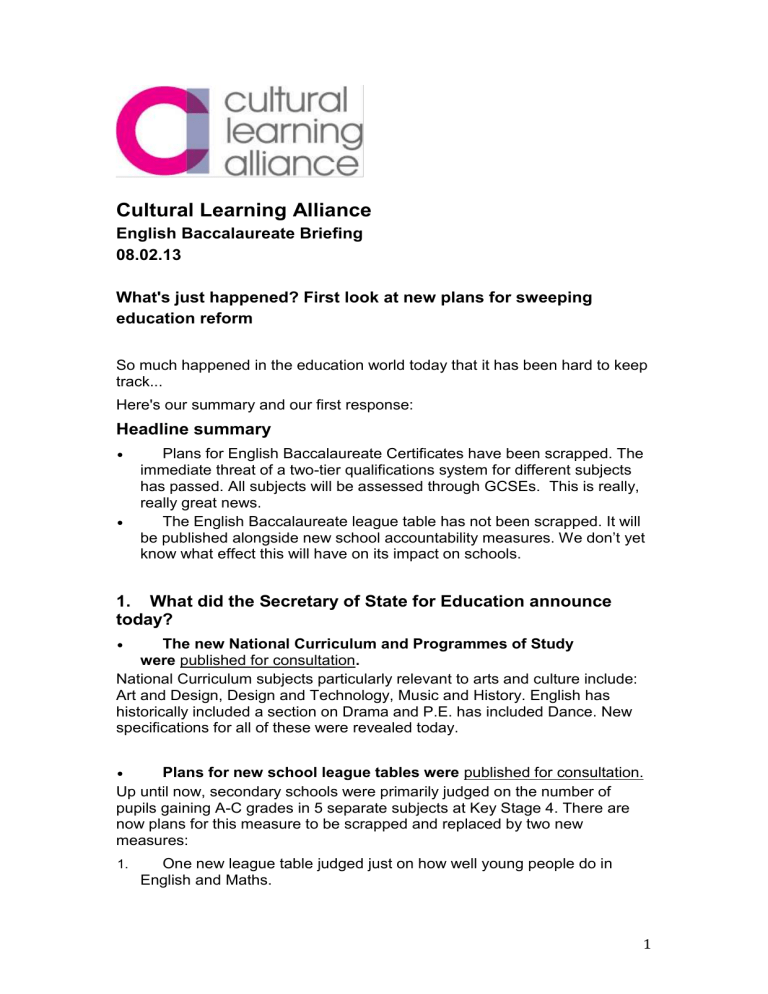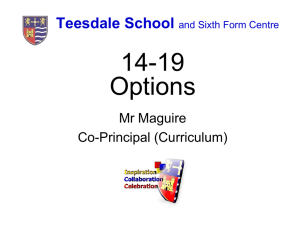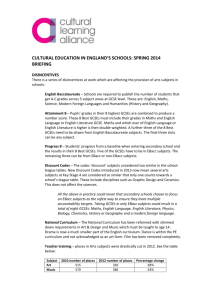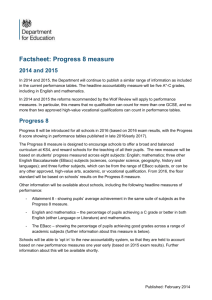CLA paper responding to Michael Gove`s

Cultural Learning Alliance
English Baccalaureate Briefing
08.02.13
What's just happened? First look at new plans for sweeping education reform
So much happened in the education world today that it has been hard to keep track...
Here's our summary and our first response:
Headline summary
Plans for English Baccalaureate Certificates have been scrapped. The immediate threat of a two-tier qualifications system for different subjects has passed. All subjects will be assessed through GCSEs. This is really, really great news.
The English Baccalaureate league table has not been scrapped. It will be published alongside new school accountability measures. We don’t yet know what effect this will have on its impact on schools.
1. What did the Secretary of State for Education announce today?
The new National Curriculum and Programmes of Study were published for consultation .
National Curriculum subjects particularly relevant to arts and culture include:
Art and Design, Design and Technology, Music and History. English has historically included a section on Drama and P.E. has included Dance. New specifications for all of these were revealed today.
Plans for new school league tables were published for consultation.
Up until now, secondary schools were primarily judged on the number of pupils gaining A-C grades in 5 separate subjects at Key Stage 4. There are now plans for this measure to be scrapped and replaced by two new measures:
1. One new league table judged just on how well young people do in
English and Maths.
1
2. One new league table judged on how well young people do in their 8 best GCSE qualifications. These 8 must include English and Maths, three
EBacc subjects and three other subjects of their choosing. It is important to note that this can include arts subjects, but it doesn’t have to.
Plans to create a new Key Stage 4 qualification called an English
Baccalaureate Certificate (EBC) were dropped. Instead, GCSEs will be extensively reformed.
Initially, the government planned to create these new EBC qualifications for
EBacc subjects – with different kinds of qualifications created for the other subjects. These plans have been scrapped.
Instead, GCSEs will remain at
Key Stage 4, but they will be reformed.
The government’s initial plans were for EBC qualifications to be linear and heavily exam and essay based. GCSEs will be reformed along these lines.
The Secretary of State has asked Ofqual to reform GCSEs for EBacc subjects first, but for other subjects to follow suit.
Plans for a ‘Statement of Achievement’ for those students not getting GCSEs in 5 EBacc subjects have been scrapped.
Plans to reform the market and make exam boards compete to deliver qualifications were dropped
The DfE planned for exam boards to compete to be the providers of each subject’s exam – meaning only one exam board per discipline. This has been scrapped (with Gove citing EU procurement law as the reason).
The results of last year’s Key Stage 4 Qualification
Consultation were published.
Over 5,500 responses were received and of them 3,116 people wrote in to support the arts and culture and to call for their inclusion in the EBacc. This is an amazing result and testament to the colleagues working tirelessly to spread the word on this: Bacc for the Future and Include Design to name but two.
The consultation does contain some serious findings on the nature of the
EBacc. E.g.: ‘
Eighty-four per cent of responses said that we had not identified the right collection of subjects, with just over half of responses that were not part of a campaign giving this view.’
2. What did not happen?
The English Baccalaureate league table measure has not been scrapped or modified.
None of the reforms announced today will fundamentally change the league table that is published on the EBacc subjects . It will continue as it is. DfE plans are for the information on EBacc to be provided alongside
2
information on the two new accountability measures announced today, and other headline information as determined by the consultation.
3. What is great about this?
The Cultural Learning Alliance and its members had some real concerns about the introduction of the English Baccalaureate Certificates. We felt that their introduction could lead to a two-tier system, where arts and cultural subjects would be learned through a different and less important type of examination. We were very clear that this should not be the case and that arts qualifications at Key Stage 4 should be equal in status, size and rigour to those developed for the EBacc subjects. With GCSEs now set to remain for all subjects, the immediate threat of the two-tier system has passed.
This is fantastic news.
Michael Gove made several pointed statements about the importance of the arts, particularly when prompted by MP Fiona McTaggart:
‘I hope that the clarity that we have provided today on the accountability in the reforms will reinforce the fact that, for the hon. Lady and for me, artistic and creative subjects are central to a broad and balanced education.’
It is also great that the Secretary of State and the DfE have taken on expert advice and have listened to some of the concerns flagged up in their recent
Key Stage 4 Qualifications Consultation. We sincerely hope this continues and look forward to giving our views in the forthcoming consultations.
4. What don’t we know?
We don’t know how the new accountability measures will affect the way that schools have been reacting to the English Baccalaureate league table. We know that last year alone 15% of schools withdrew an arts subject as a direct response to the EBacc
. We sincerely hope that the new ‘8 best qualifications’ measure will encourage all heads to reverse this worrying trend and ensure that they have a broad and balanced, exciting, artistic, cultural and creative curriculum and that they invest the time and resources that arts and cultural subjects need and deserve. It will be some time before we can get data on the actual impact of this measure.
We don’t know yet what the new GCSEs for cultural and creative subjects will look like
– though we are very hopeful that they will be fit for purpose, will be assessed through a range of methods including performance and portfolio, and will be fantastic. Michael Gove indicated that he would be working with
‘Arts Council and others’ to develop high-quality content. This is great news.
We haven’t yet been given a chance to comment or consult on the plans for new Key Stage 5 league tables in ‘facilitating subjects’ – essentially an
English Baccalaureate as applied at A-level). The DfE confirmed verbally today that this consultation is on its way.
Over the last ten years take up of GCSEs in the arts by young people has steadily declined. We do not know whether these measures will reverse this.
None of the measures announced today have been specifically designed to
3
incentivise arts and culture in the same way that the EBacc is incentivising its subjects.
We have not yet seen clear information about the status of vocational qualifications in all this.
We do not yet know what reaction experts will have to the draft Programmes of Study for arts and cultural subjects in the National Curriculum. A very quick glance might seem to indicate that Dance is at least mentioned in PE, that
Drama is still not adequately reflected in English, and that Film and Media are not mentioned at all. Early statements from the Design Council express doubts about the ‘ambition, innovation and relevance’ of the Design proposals and label them as ‘potentially retrograde’.
We still don’t know when the Department of Education will publish their now long overdue National Plan for Cultural Education.
5. What will happen next?
All these plans are now out for consultation. If we think they can be improved, now is the time to say so!
As always the Cultural Learning Alliance will be pulling together joint responses from across the Alliance and will be signposting all our members to the best ways that they can make their voices heard.
In the meantime you can checkout the consultation documents here:
Curriculum consultation closing date: Tuesday 16 April 2013.
Accountability consultation closing date: Wednesday 1 May 2013
We will be putting together a more considered response and analysis over the next week. Get in touch and let us know how this is affecting you and what your take is on it all.
lizzie@culturallearningalliance.org.uk
4







